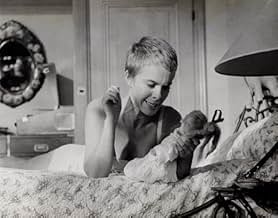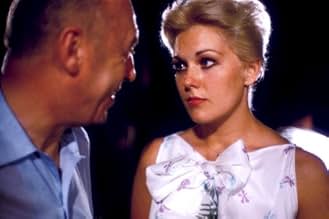VALUTAZIONE IMDb
6,8/10
6039
LA TUA VALUTAZIONE
Cecile è una giovane ragazza decadente che vive con il suo ricco padre playboy, Raymond. Quando Anne, la vecchia amante di Raymond, arriva nella villa, Cecile ha paura del suo modo di vivere... Leggi tuttoCecile è una giovane ragazza decadente che vive con il suo ricco padre playboy, Raymond. Quando Anne, la vecchia amante di Raymond, arriva nella villa, Cecile ha paura del suo modo di vivere.Cecile è una giovane ragazza decadente che vive con il suo ricco padre playboy, Raymond. Quando Anne, la vecchia amante di Raymond, arriva nella villa, Cecile ha paura del suo modo di vivere.
- Regia
- Sceneggiatura
- Star
- Nominato ai 1 BAFTA Award
- 2 candidature totali
Tutte Lemkow
- Pierre Schube
- (non citato nei titoli originali)
Maryse Martin
- Undetermined Secondary Role
- (non citato nei titoli originali)
Edouard F. Médard
- Bit part
- (non citato nei titoli originali)
Jackie Raynal
- Dancer
- (non citato nei titoli originali)
Recensioni in evidenza
The wonderfully fresh and vivacious Jean Seberg here shines in her second film. The previous year she had played Joan of Arc (chosen from 18,000 young girls who auditioned for the role), and here Otto Preminger directs his protégé again to superb effect. The film opens with very dramatic music by Georges Auric. This film is based upon the best-selling first novel by the young Francoise Sagan, which created a scandal then but now is not scandalous at all. What passed for 'decadence' at the time was a life of aimless idling by the rich on the Riviera, some gambling, some boating, some swimming, some affairs, and a great deal of insipid self-indulgence. This we see epitomised in Seberg's father, played to perfection by David Niven, a shallow idler and womanizer who straightens his bow tie self-consciously between seductions in the bushes. He and Jean have a 'father-and-daughter-thing' because her mother died long ago, and they really don't want anybody else in their lives apart from casual partners with whom they can romp, only to throw them away when used, joking about them to each other as they get ready to have an evening out. As the film opens, Niven's girlfriend of the moment is Elsa, a charmingly empty-headed creature played delightfully by Mylene Demongeot, who shows such talent as a restrained comedienne. Juliette Greco makes a full-throated appearance in a club, singing the film's theme song all the way through as the dancing and whirling Jean stares at her glassy-eyed over men's shoulders, lost in haunted visions of regret. In 1958, the teenage girls of Britain all swooned over and identified with Jean Seberg, who seems to have originated the shorn boyish haircut which Mia Farrow later copied. Niven as the amiable cad was pretty much what one would expect. But into this mix comes Miss Straight, in the form of Deborah Kerr, who says to Niven when he gets flirty: 'I don't want to be casual.' That's for sure. When Niven finally decides he wants to marry her, she becomes a Little Hitler in no time, bossing Jean around, stopping everyone having 'fun', and generally making herself odious with her control-freakery. This leads to a campaign to drive her out by Jean and Elsa, who has been unceremoniously dumped. Meanwhile, Kerr has fallen hard, and in a revealing shot in the harsh sun we even discover that her true complexion was rather gingery and freckly, something concealed in her other films. Tragedy is not long in coming, hence the 'tristesse'. This is a social document of the 1950s which people interested in knowing what things were once like should watch. The film is directed by a master, Preminger, and Jean Seberg 'makes it' entirely. She is so refreshing, natural, young, real. Poor Jean Seberg. By the age of 40 she was dead. But she left much to remember her by: no one who has seen 'Breathless' (1960) can ever forget her. This film too keeps her wonderful memory alive. Her best acting performance was probably in 'Lilith', but she does well enough here, wholly dominating the screen and acting circles round the old pros. Oh yes, and then there's the inside joke about Eveline Eyfel playing three identical sisters who act as the maid, which is an amusing touch. The Mediterranean sparkles in the sunshine, the pine trees along the beach are exuding their aroma, swim suits dry in minutes: come on in, the water's fine!
This is an absorbing, intriguing and slightly bizarre film. I agree with the other comments here - the camera work is beautiful, the Riviera looks fab, Seberg is startling, and David Niven (how come no-one's mentioned his performance yet?) is a particularly slimy, lecherous old man. Seberg really does deliver an excellent performance. She's a fascinating person anyway, and here her ambiguity, her modernity, her beauty and her youth all come into their own. And the title song's fab too! Well worth a watch, if only to revel in the stunning scenery and Seberg's haunting screen presence.
The films of Otto Preminger share for the most part a detached objectivity in their attitudes to character and moral issues
In "Bonjour Tristesse," his gamine protégé Cecile (Jean Seberg) is a very peculiar girl, maybe spoiled and willful and arrogant and lazy
Anne (Deborah Kerr) had made her look at herself for the first time in her life And that turned her against her And now, her father is not having fun anymore, which was probably another reason she decided to get rid of her How carefully and how seriously she went about that decision, is the tale of Françoise Sagan, published in 1954, by the time she was nineteen
Raymond (David Niven) is a bundle of surprises For him, it's such a wonderful fun to have Cecile for a daughter And loving Anne doesn't mean that he loves his daughter any less The wealthy playboy becomes serious from the moment that Anne arrived He could never think of her as just someone to have fun with He does have fun with Elsa (Mylène Demongeot) but that's a long way from being all he wants Now, he has never wanted any woman the way he wants Anne
Anne spent her honeymoon by the sea 12 years ago She had quite a debate with herself before coming down to the French Riviera For knowing that Elsa was there, she got stupidly angry and decided to leave Then the prospect of packing and looking for a hotel was too much after that long drive so she decided to stay
Being too sophisticated (maybe for discovering occupied territory), Anne was as suspicious of summer as she was of Raymond in spite of the fact that she knew him 15 years ago, and was quite sure that with him, nobody is safe
For Cecile, Anne is prim and prissy and prude For a woman who hates vulgaritieseven when they're funnyshe could never be seriously interested in a man like her father So part of her was angry, part was happy, all of her was excited Her father had brought a girl to the seashore, made her go out in the sun and then when she was a mess of peeling, dropped her like a hot lobster It was unfair Yet even while she was angry at him, she was proud that he had gotten the unattainable Anne Anne looks now softer She moves easier In the morning, she seems as though she had the most wonderful secret in the world
Suddenly she becomes aware of a great responsibility towards Cecile, as it would be good if she stops seeing Philippe (Geoffrey Horne) and studies for her philosophy examination
Cecile becomes furious at her interference Anne wants her to study and not to see Philippe So what shall it be? For her, there'll be a man to take care of her And she doesn't need a diploma for that
Now she hates Anne For her, she has changed her father She'll change her and will change everything
In "Bonjour Tristesse," his gamine protégé Cecile (Jean Seberg) is a very peculiar girl, maybe spoiled and willful and arrogant and lazy
Anne (Deborah Kerr) had made her look at herself for the first time in her life And that turned her against her And now, her father is not having fun anymore, which was probably another reason she decided to get rid of her How carefully and how seriously she went about that decision, is the tale of Françoise Sagan, published in 1954, by the time she was nineteen
Raymond (David Niven) is a bundle of surprises For him, it's such a wonderful fun to have Cecile for a daughter And loving Anne doesn't mean that he loves his daughter any less The wealthy playboy becomes serious from the moment that Anne arrived He could never think of her as just someone to have fun with He does have fun with Elsa (Mylène Demongeot) but that's a long way from being all he wants Now, he has never wanted any woman the way he wants Anne
Anne spent her honeymoon by the sea 12 years ago She had quite a debate with herself before coming down to the French Riviera For knowing that Elsa was there, she got stupidly angry and decided to leave Then the prospect of packing and looking for a hotel was too much after that long drive so she decided to stay
Being too sophisticated (maybe for discovering occupied territory), Anne was as suspicious of summer as she was of Raymond in spite of the fact that she knew him 15 years ago, and was quite sure that with him, nobody is safe
For Cecile, Anne is prim and prissy and prude For a woman who hates vulgaritieseven when they're funnyshe could never be seriously interested in a man like her father So part of her was angry, part was happy, all of her was excited Her father had brought a girl to the seashore, made her go out in the sun and then when she was a mess of peeling, dropped her like a hot lobster It was unfair Yet even while she was angry at him, she was proud that he had gotten the unattainable Anne Anne looks now softer She moves easier In the morning, she seems as though she had the most wonderful secret in the world
Suddenly she becomes aware of a great responsibility towards Cecile, as it would be good if she stops seeing Philippe (Geoffrey Horne) and studies for her philosophy examination
Cecile becomes furious at her interference Anne wants her to study and not to see Philippe So what shall it be? For her, there'll be a man to take care of her And she doesn't need a diploma for that
Now she hates Anne For her, she has changed her father She'll change her and will change everything
Film makers love to show off the Rivera, and for good reason. It's one of the most spectacular venues in the world. However, it's interesting to compare Preminger's Rivera with those of Hitchcock in "To Catch a Thief" and Powell's in "The Red Shoes". In "The Red Shoes" the Riviera is merely a setting in which artists work obsessively to create their art while paying virtually no attention to it. For Hitchcock, the Riviera is a lush background for intrigue. In Preminger's "Bonjour Tristesse" the Riviera represents the lifestyle that the characters desire; luxurious, sensual, hedonistic and, ultimately, empty. "Bonjour Tristesse" is worth seeing for the Riviera, which looks fabulous, and Jean Seberg, who looks fabulous. However, the story is as shallow as the characters.
I do not think that it would be giving away the plot to say that the viewer is led to believe from the very beginning that he is seeing a tragedy. After all, the title translates as "Hello, Sorrow". Furthermore, the opening exposition, filmed in somber black-and-white, leads one to believe that the lives of the protagonists have been devastated by some great tragedy. However, from the very beginning it is also obvious that this impression is not true at all. The father and daughter are depicted as a pair of shallow, selfish, hedonists who care nothing for anything or anyone beyond each other and their own immediate gratification.
The story does not even mention exactly what, if anything, it is that the father does for a living. He is obviously extremely wealthy, but is never seen to do any sort of work or transact any business. It was apparently sufficient for the author that he should be nothing more than a rich, idle, middle-aged playboy who changes his cars as frequently as his daughter, who never wears the same outfit twice, changes her clothes.
In short, not only are the characters in this story not real people, they are not even sympathetic unreal people. It's bad enough having to put up with an hour and a half movie about mannequins without them having to be unlikable mannequins.
I do not think that it would be giving away the plot to say that the viewer is led to believe from the very beginning that he is seeing a tragedy. After all, the title translates as "Hello, Sorrow". Furthermore, the opening exposition, filmed in somber black-and-white, leads one to believe that the lives of the protagonists have been devastated by some great tragedy. However, from the very beginning it is also obvious that this impression is not true at all. The father and daughter are depicted as a pair of shallow, selfish, hedonists who care nothing for anything or anyone beyond each other and their own immediate gratification.
The story does not even mention exactly what, if anything, it is that the father does for a living. He is obviously extremely wealthy, but is never seen to do any sort of work or transact any business. It was apparently sufficient for the author that he should be nothing more than a rich, idle, middle-aged playboy who changes his cars as frequently as his daughter, who never wears the same outfit twice, changes her clothes.
In short, not only are the characters in this story not real people, they are not even sympathetic unreal people. It's bad enough having to put up with an hour and a half movie about mannequins without them having to be unlikable mannequins.
Reviews of this film are more interesting and thought provoking than most. A number of them convey critical insights that certainly deepened my appreciation. Yes, the film is flawed, but it also resonates beyond standard soap opera mainly because of its tragic central premise. That the movie doesn't fully realize its aim, I'm sorry to say, is largely because of limitations in Seberg's performance. I agree, she's a lively and compelling screen presence with a freshness that's genuinely appealing. However, the role of Cecile calls upon more emotional depth than Seberg manages to convey, especially with the absence of troubled emotions. Thus the sense of tragic outcome stems from sources other than Seberg's performance. Now, there are several ways of looking at Cecile's emotional make-up and maturity, but there's one I believe that most strongly recommends itself and also puts Seberg's performance in the best light.
On this view, Seberg has Cecile's character just right during the sunny Technicolor phase. Cecile is simply too immature to realize the potential consequences of her scheming actions. Thus, Cecile (Seberg) attaches no more gravity to breaking up her father's relationship than she does to skipping her studies. She's all spoiled selfishness wrapped in a winsome smile. And it's not until the car crash that she realizes the consequences of her selfish act, and experiences an emotional depth for the first time. Her scheme thus results not from making a wrongful choice but from not even realizing that a choice is being made. This view would vindicate nine-tenths of Seberg's unconflicted Technicolor performance, but not the black- and-white phase where Seberg fails to convey the conflict required. This view would also explain the added features of narration, color change and Saul Bass graphics once Preminger realizes that Seberg's performance is not enough to convey the necessary sense of tragedy.
Despite this central flaw, the movie remains oddly haunting. Maybe it's because of a sun- washed paradise so carelessly lost, or of a summer of such promise turned into a lifetime of regret. I really like the observation that father and daughter behave as though actions have no consequences. As a result, their humanity is only realized once the importance of this lesson is tragically driven home. Only by then, it's too late. In my view, the movie remains regrettably underrated.
On this view, Seberg has Cecile's character just right during the sunny Technicolor phase. Cecile is simply too immature to realize the potential consequences of her scheming actions. Thus, Cecile (Seberg) attaches no more gravity to breaking up her father's relationship than she does to skipping her studies. She's all spoiled selfishness wrapped in a winsome smile. And it's not until the car crash that she realizes the consequences of her selfish act, and experiences an emotional depth for the first time. Her scheme thus results not from making a wrongful choice but from not even realizing that a choice is being made. This view would vindicate nine-tenths of Seberg's unconflicted Technicolor performance, but not the black- and-white phase where Seberg fails to convey the conflict required. This view would also explain the added features of narration, color change and Saul Bass graphics once Preminger realizes that Seberg's performance is not enough to convey the necessary sense of tragedy.
Despite this central flaw, the movie remains oddly haunting. Maybe it's because of a sun- washed paradise so carelessly lost, or of a summer of such promise turned into a lifetime of regret. I really like the observation that father and daughter behave as though actions have no consequences. As a result, their humanity is only realized once the importance of this lesson is tragically driven home. Only by then, it's too late. In my view, the movie remains regrettably underrated.
Lo sapevi?
- QuizOtto Preminger always liked this film, although he felt the American critics did not do it justice. The film was a qualified success in France, yet American critics felt the film wasn't French enough, a detail that amused Preminger.
- BlooperWe hear the Band at c.6'50" and we see a clarinet-player performing, but the music has no clarinet part whatsoever included at that point in the soundtrack. Later, when the clarinet does eventually join the soundtrack, the fingering of the player bears absolutely no relation to the music actually being heard.
- ConnessioniEdited into Histoire(s) du cinéma: Une histoire seule (1989)
I più visti
Accedi per valutare e creare un elenco di titoli salvati per ottenere consigli personalizzati
- How long is Bonjour Tristesse?Powered by Alexa
- What is 'Bonjour Tristesse' about?
- Is "Bonjour Tristesse" based on a book?
- What does the title mean?
Dettagli
Botteghino
- Lordo in tutto il mondo
- 446 USD
- Tempo di esecuzione1 ora 34 minuti
- Colore
- Proporzioni
- 2.35 : 1
Contribuisci a questa pagina
Suggerisci una modifica o aggiungi i contenuti mancanti

Divario superiore
By what name was Bonjour tristesse (1958) officially released in India in English?
Rispondi






















